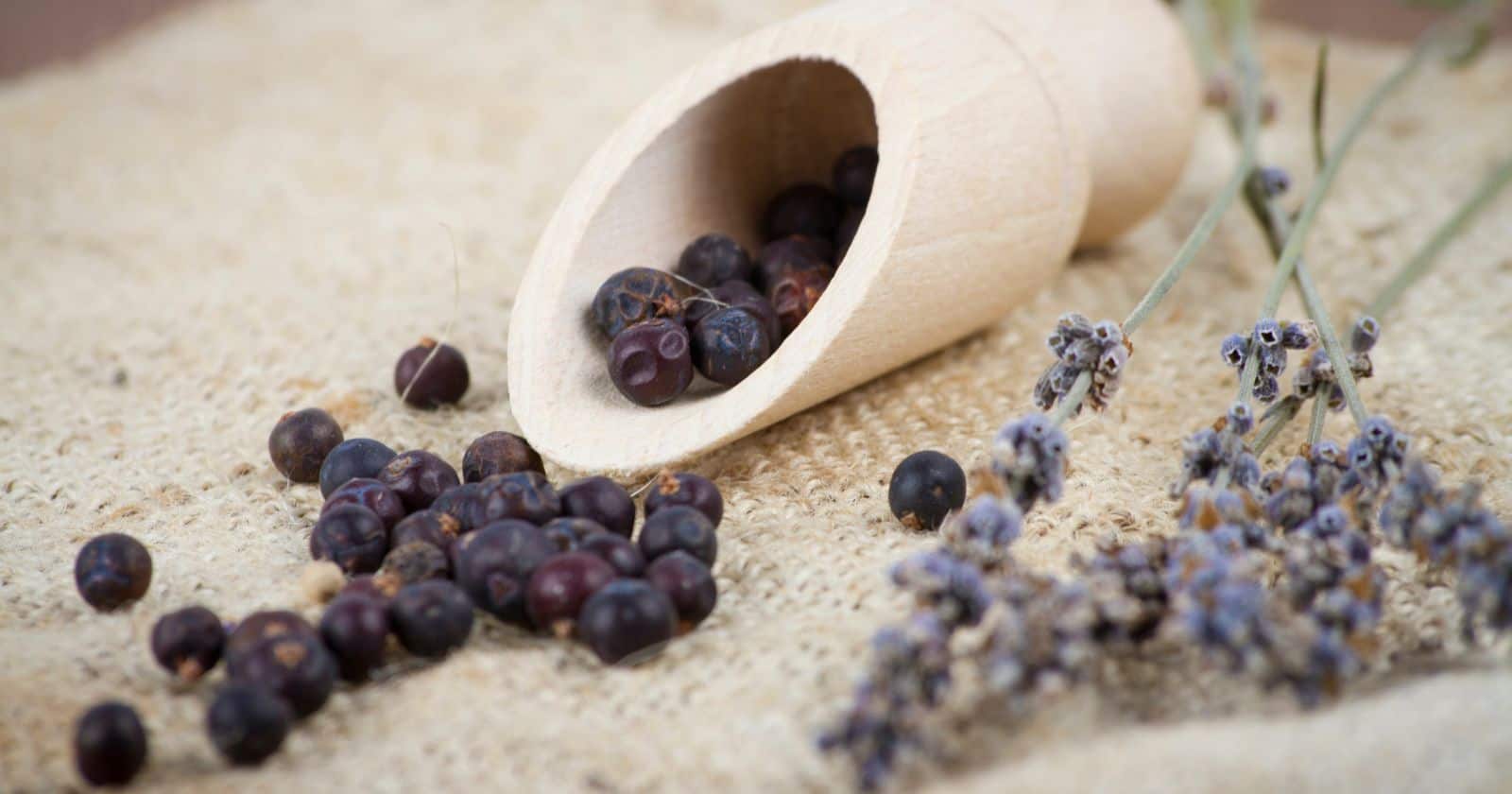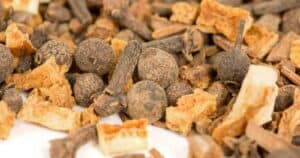Are you tired of using the same old spices in your cooking and want to change things? Look no further than juniper berry! This secret ingredient has been used for centuries in cuisines worldwide and will surely add a unique flavor to your next meal.
But that’s not all – if you struggle with the gamey taste of venison or urinary tract infections, juniper berries could be the solution to your problems.
Get ready to elevate your cooking game with the addition of juniper berries! In this article, we’ll explore the history and uses of juniper berries in cooking and their health benefits.
We’ll also provide some delicious recipes incorporating this
The History of Juniper Berries in Cuisine
Juniper berries have played an essential role in cuisine for centuries. Ancient civilizations like the Egyptians and Greeks used juniper berries in medicine, while the Romans used them to aid digestion.
In northern European and Scandinavian cuisine, juniper berries are commonly used to add a unique flavor to meat dishes, especially game birds like pheasant and duck.
Even the Desert Serrano culture in the Mojave River region has utilized juniper berries in their cuisine.
Juniper berries have a distinctive flavor often described as piney and slightly fruity. The berries themselves are a type of cone, and they are commonly harvested in the fall when they are fully ripened. Once harvested, the berries can be used fresh or dried for culinary purposes.
In cuisine, gin creation is one of the most popular uses for juniper berries. Gin is a distilled spirit flavored with juniper berries and other botanicals, such as coriander and angelica root. Juniper berries are also commonly used in marinades for meat dishes like venison and wild boar and in sauces for roasted meats.
In addition to their culinary uses, juniper berries have several health benefits. They are rich in antioxidants and have been shown to have antibacterial and antifungal properties. They have been used in traditional medicine to treat everything from arthritis to menstrual cramps.
Juniper Berry as a Unique and Flavorful Spice
Juniper berries are one of the most unique and flavorful spices out there. They pack a punch with their intense spiciness and piney notes that can’t be found in any other
These berries pair perfectly with various flavors, including caraway, garlic, marjoram, pepper, and rosemary. Whether you’re making gin, tea, meat dishes, brines, sauerkraut, rubs, or seasoning mixes, juniper berries are a fantastic choice to add that extra burst of flavor that keeps your taste buds interested.
In Northern European cuisine, juniper berries are an essential ingredient that adds depth and flavor to various dishes. Fresh or dried berries are crushed and added to stews, soups, and game meats to add a unique flavor that’s hard to replicate.
They’re also commonly used in pickling brines and rubs to infuse meats with their spicy taste. Many people are surprised to learn that juniper berries can also be used to make tea, which has a pleasant and relaxing effect on the body.
If you’ve ever tasted a gin and tonic, you’ve tasted juniper berries. One of the most popular uses of juniper berries is flavoring gin derived from the Juniperus communis plant.
These tiny blueberries are soaked in alcohol to extract their flavor and then added to gin to give it that classic piney and earthy flavor that gin lovers adore. They’re also used in other spirits, including whiskey and vodka, to add a unique twist to classic cocktails.
The Surprising Health Benefits of Juniper Berries
Juniper berries contain nutrients and plant compounds that provide many health benefits. The surprising health benefits of juniper berries include:
- Boosts Immune System: Juniper berries are a rich source of vitamin C, which is essential for a robust immune system. It helps to prevent infections, improve iron absorption, and boost collagen production in the body.
- Acts as a Diuretic: Juniper berries are a natural diuretic that increases the flow of urine, which helps to eliminate excess fluids and toxins from the body. It also stimulates kidney function and reduces the risk of kidney stones.
- Relieves Oxidative Stress: Juniper berries contain antioxidants that help to prevent oxidative stress, which can cause chronic diseases such as heart disease and cancer.
- Acts as a Natural Antiseptic: Juniper berries contain natural antiseptic properties that help to kill bacteria and prevent infections. They commonly treat respiratory infections, UTIs, and other microbial infections.
- Improves Skin Health: Juniper berries contain anti-inflammatory properties that help to soothe skin irritations and conditions such as eczema and psoriasis. They also have astringent properties that reduce oiliness and prevent acne.
- Improves Digestion: Juniper berries have antispasmodic properties that help to soothe the digestive system and ease digestive discomfort. They can also improve appetite and aid in weight loss.
Juniper Berry Recipes to Try at Home
Juniper Berries are a fantastic ingredient to use in your cooking, and many tasty recipes are waiting to be tried at home. From savory dishes like Juniper Berries Salmon and Chicken with Tarragon and Juniper Berries to sweet treats like Rhubarb and Juniper Berry Jam, there is something for everyone.
These berries add a unique flavor to your dishes and have health benefits such as anti-inflammatory properties, and are high in antioxidants.
If you are feeling adventurous and want to create new recipes, experiment with different combinations of ingredients to find perfectly balanced flavors.
If you want to add a touch of juniper berries to your dishes, try rubbing crushed juniper berries into the meat before roasting it. Alternatively, you can make a flavorful tea by soaking the berries in hot water.
One dish to try is Slow-Cooked Juniper Beef Stew, comfort food perfect for cold days. Ingredients such as juniper berries, beef broth, chopped onions, and diced carrots are slow-cooked together to form a hearty stew. The juniper berries add a warming and earthy flavor and aroma to the hash, making it even more satisfying.
Another recipe to try is German Braised Red Cabbage. This recipe includes a combination of red cabbage, sliced apples, honey, and juniper berries. The juniper berries balance the sweetness of the apple and love with their slightly bitter flavor, making the dish taste more complex and exciting.
How to Properly Store and Use Juniper Berries in Your Kitchen
Juniper berries are a great addition to any kitchen, but storing them to keep their flavor fresh properly is essential. To save juniper berries from losing their flavor, store them in an airtight container in a cool, dry place away from direct sunlight. This will help keep the berries fresh and aromatic, allowing you to use them in various dishes.
When it comes to using juniper berries, there are various ways to incorporate them into your cooking. Here are a few ideas:
- Crushed juniper berries can be used to season meats or as a flavoring for sauces and marinades. Place a tablespoon into a zippered bag to crush the berries and lightly smash them with a meat mallet, hammer, or wine bottle.
- You can also use juniper berries to create a unique flavor in dishes like Juniper Berries Salmon. Simply combine salmon with butter, juniper berries, and lime zest for a delicious and flavorful sauce.
- When cooking with juniper berries, consider rubbing the crushed berry into the meat with ginger or garlic before searing it. This will give your dish a deeper, more complex flavor. You can also deglaze the pan with wine or broth to create a rich, flavorful sauce.
Juniper Berry Substitute
Juniper berry substitute? Look no further! Gin, rosemary, bay leaves, caraway seeds, and cardamom are all great options.
Gin is the most obvious due to its juniper composition. Rosemary can be an excellent substitute, using one sprig to replace a single berry. Bay leaves, and caraway seeds are practical options that can add more flavor complexity. Remember a 1:1 ratio to match the juniper berry flavor when using cardamom.
- Gin is the clear choice when crafting a juniper-based cocktail without the actual berries. However, it’s only sometimes necessary to use alcohol when preparing dishes that require juniper berries.
- Rosemary, for example, can be a fantastic alternative when making savory dishes like meat stews.
- Bay leaves are ideal for soups and stocks, providing a similar earthy flavor profile.
- Caraway seeds, which taste slightly sweet, can replace juniper berries in sauerkraut and other pickled dishes.
- Cardamom, another great substitute, offers a warming
spice flavor similar to juniper berries. Thisspice pairs best with pork or lamb, adding depth to the meat.
Remember that ground cardamom will provide a more robust flavor than whole pods, so adjust accordingly.





